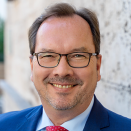Is the West in the process of redefining itself, or is “the West” becoming an obsolete category altogether? A debate at the DGAP
For transatlantic security experts, it is sobering to see how far the countries of the West are from providing a united response to the crisis in Syria. Americans and Europeans are following different policy channels. Arguments are occurring over whether a military strike against the Assad regime would have an impact; focusing on the question of chemical weapons means other aspects of the crisis are being neglected; and the struggle for a resolution in the UN Security Council has, until now, been in vain. In short: the ability to take action looks different. Henning Riecke, who heads the DGAP’s program on transatlantic relations, sees three grounds for the US’s hesitation in the matter: the experience it drew from operations in Afghanistan, the country’s enormous national debt, and the superpower’s strategic shift in focus toward Asia.
The helplessness of the West – not only in the Syria question – was a driving force for many of the evening’s participants. Vital Western interests are at stake here: nothing less than the need to stop a humanitarian catastrophe, to master the stream of refugees, and to bring weapons of mass destruction into check. “The Syria crisis is holding a mirror up to us,” said Eberhard Sandschneider, summing up the meaning of the current crisis for international relations. It once again underlines the inability of Western countries to act in a united way – and, in doing so, shows the West’s irrelevance as a much-invoked community of values.
But perhaps, Riecke suggested, the West has other trademark qualities: to deliberate over the situation carefully rather than immediately forcing a quick solution, to hold back in doubt, and also to be open to self-criticism. The West is more than simply a military alliance with a leading power that rushes forward. NATO, too, does not have the sole role of implementing military operations but rather also serves its members as a forum for political exchange among like-minded partners.
The West needs to strengthen its non-military resources …
Josef Janning, Mercator Fellow at the DGAP’s Alfred von Oppenheim Center for European Policy Studies, pointed to the ways in which international crisis management in Syria differs from earlier cases. Those countries that lead the West in matters of security like the US and Great Britain are now clearly showing greater restraint in committing their military power. For one thing, they are paying more attention to public opinion on global questions. For another, legislatures are being granted more of a say in foreign policy decisions. Time will tell whether on not this will be a long-term development.
However: if a culture of military restraint is going to become a general characteristic of the West, much as it did in postwar Germany, then the very existence of this “new West” depends on drawing the right conclusions – for such a development is not going to bring more security. “The new West must look for alternative instruments,” Janning continued. And this means above all strengthening its non-military resources: placing much more emphasis on the early recognition of conflicts; backing more humanitarian aid; and pushing forward on UN reform. Janning highlighted the enormous amount of effort this will require but also expressed his optimism that the West would be able to increase its capabilities in this regard.
… and get off its high horse (of moral values)
For Sandschneider, on the other hand, the Syria crisis quite clearly shows the weaknesses of the West, and of the Western community of values in particular. “Den Werte-Westen gibt es nicht” – the West, as defined by values, does not exist. The partnership of convenience that marked the Cold War has in the meantime drifted apart in terms of political positions and as well as from the point of view of norms and values. With the repositioning of global power over the past two decades, the West is now in retreat.
In terms of international action in a concrete case (i.e., Syria), moreover, an approach premised on our local moral concepts is of very little use, anyway. International crisis management should not tackle the problem from a perspective that is too Western, but this is all too often the case. According to Sandschneider, prescribing standard security policy packages that contain too large a dose of our own perspective would be the wrong medicine – and will always bring about something other than what was intended.
The participants in the discussion did agree that a stronger consideration of regional conditions was necessary in place of proclaiming Western values and structures. For this, however, it is more important than ever to take account of the local particularities and to acquire detailed knowledge of the country, Sandschneider warned. “We need to look around more carefully and pursue dialogue both with the elite and the opposition.” Expanding on this, Janning added that in doing this the West will remain intact, even if it does not “export” its values.
The discussion at the DGAP made clear the degree to which the crisis in Syria is pushing the Western states into clearly establishing a foreign-policy position and indeed touches on the West’s basic understanding of itself. According to Riecke, clarity will come from keeping one’s own fundamental interests in mind and, for the West, this has for a long time included curbing violent conflicts. As Janning added, efforts to achieve stability must above all relate to the regional context; we can help shape our neighborhood not only in consideration of our ideals but also with a healthy dose of realpolitik.
Eberhard Sandschneider invited participants to take part in the discussion at the DGAP as part of a series of events considering the role of values and interests in German foreign policy. The conversation will continue in the course of the autumn. Our website will provide information on the next event as soon as the date is set.


